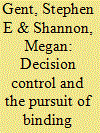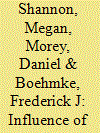|
|
|
Sort Order |
|
|
|
Items / Page
|
|
|
|
|
|
|
| Srl | Item |
| 1 |
ID:
135954


|
|
|
|
|
| Summary/Abstract |
While United Nations peacekeeping missions were created to keep peace and perform post-conflict activities, since the end of the Cold War peacekeepers are more often deployed to active conflicts. Yet, we know little about their ability to manage ongoing violence. This article provides the first broad empirical examination of UN peacekeeping effectiveness in reducing battlefield violence in civil wars. We analyze how the number of UN peacekeeping personnel deployed influences the amount of battlefield deaths in all civil wars in Africa from 1992 to 2011. The analyses show that increasing numbers of armed military troops are associated with reduced battlefield deaths, while police and observers are not. Considering that the UN is often criticized for ineffectiveness, these results have important implications: if appropriately composed, UN peacekeeping missions reduce violent conflict.
|
|
|
|
|
|
|
|
|
|
|
|
|
|
|
|
| 2 |
ID:
107967


|
|
|
|
|
| Publication |
2011.
|
| Summary/Abstract |
International relations scholars have garnered a good deal of evidence indicating that binding arbitration and adjudication are highly effective means for brokering agreements and ending conflict. However, binding third-party conflict management is rarely pursued to resolve interstate disputes over contentious issues like territorial or maritime control. While states value the effectiveness of binding procedures, they are reluctant to give up the decision control necessary to submit to arbitration or adjudication. The authors identify three factors that influence the willingness of states to give up decision control: issue salience, availability of outside options, and history of negotiations. An analysis of attempts to settle territorial, maritime, and river claims reveals that disputants are less likely to use binding conflict management when they have a greater need to maintain decision control.
|
|
|
|
|
|
|
|
|
|
|
|
|
|
|
|
| 3 |
ID:
101621


|
|
|
|
|
| Publication |
2010.
|
| Summary/Abstract |
We argue that international organizations decrease the duration of international conflicts by mitigating commitment problems and encouraging combatants to cease hostilities more quickly. Empirical analyses of militarized interstate dispute duration (1950-2000) reveal that increasing shared international organization (IO) participation reduces the length of disputes, even after accounting for selection into international conflict. We also find that international organizations designed to mitigate commitment problems decrease dispute duration, while IOs capable of reducing information asymmetries do not influence dispute length.
|
|
|
|
|
|
|
|
|
|
|
|
|
|
|
|
| 4 |
ID:
141652


|
|
|
|
|
| Summary/Abstract |
With ten attempts since 2010, coups d'état are surprisingly common events with vital implications for a state's political development. Aside from being disruptive internally, coups influence interstate relationships. Though coups have important consequences, we know little about how the international community responds to these upheavals. This paper explores what drives global actors to react to coups. Our theory differentiates between normative concerns (for example, protection of democracy) and material interests (for example, protection of oil exports) as potential determinants of international responses to coups. We argue that coups against democracies, coups after the Cold War, and coups in states heavily integrated into the international community are all more likely to elicit global reaction. Using newly collected data, we explore the number of signals that states and IOs send to coup states from 1950 to 2011. The analyses reveal that coups against democracies and wealthy states draw more attention. States react when democracies are challenged by coups, while IOs react to coups in Africa and coups during the post-Cold War period. We surprisingly find that heavy traders and oil-rich states do not necessarily receive more reaction, suggesting that international actors are more driven by normative concerns than material interests when reacting to coups.
|
|
|
|
|
|
|
|
|
|
|
|
|
|
|
|
|
|
|
|
|